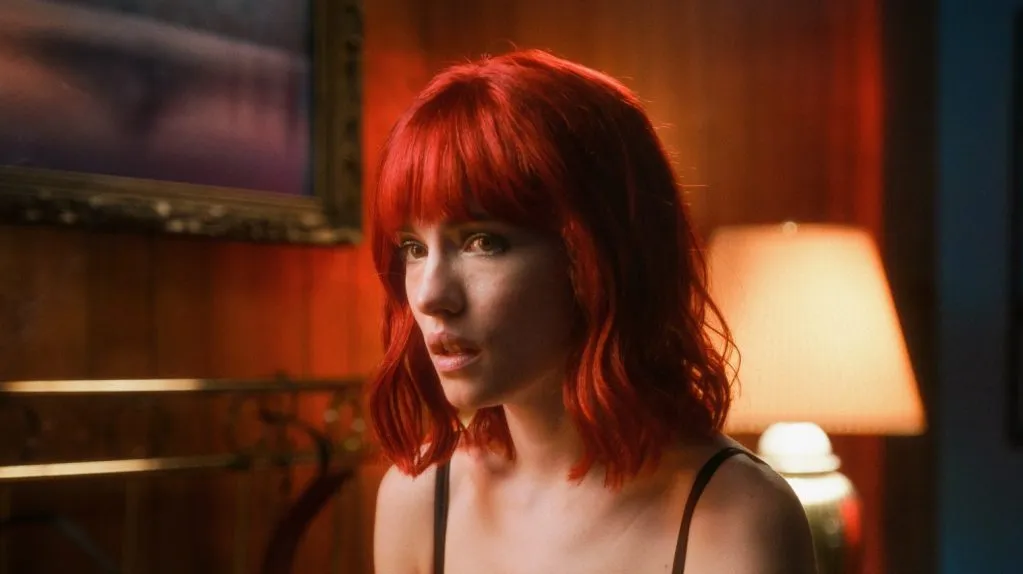Well. First, let’s get the essentials out of the way: “Strange Darling” is worth seeing. First-time cinematographer Giovanni Ribisi—better known as an actor—actually does a spectacular job. The performances are great, especially Willa Fitzgerald’s. And despite its non-linear storytelling, it packs plenty of suspense.
That’s about all I can write without spoiling everything. So if you’re going to see this movie, stop reading now. Also, please avoid any trailers.
This movie is defined by its twist. Given that, it was marketed in the absolute worst way, with a trailer full of phrases like “defies expectations” and “the cleverest thriller…” and “you must go in blind”—phrases which all but demand that the audience interrogate this coming surprise. The unfortunate part is that it’s not super hard to guess. I, for one, guessed it correctly based on the trailer alone, and I’m not even good at this sort of thing.
It kicks off with a title screen about how, between 2018 and 2020, a prolific serial killer claimed victims across multiple states in the northwest, with the rampage finally coming to an end in rural Oregon. This, it claims, is the true story of those last few murders.
We start with “Chapter 3” wherein a brutal-looking mustachioed guy in a muscular pickup truck pursues a terrified woman (Fitzgerald) in a sedan. A gunshot through her back window causes her to lose control and crash, but she manages to escape into the woods, eventually finding a secluded house where she can ask for help.
We cut to “Chapter 5.” The man searches for her as she lies trembling in an undisclosed hiding place.
Then we’re back to “Chapter 1” in which we see the two people we’ve been introduced to make their way into a hotel room to engage in some BDSM role play.
The intent, at this point, is that moviegoers ask “wow, does she get out of this hotel alive?” and are shocked when they realize that this is the wrong question.
Because that’s right, she’s the serial killer. This movie is the murder version of the famous riddle we’ve all probably heard:
A father and son are in a horrible car crash that kills the dad. The son is rushed to the hospital; just as he's about to go under the knife, the surgeon says, "I can't operate--that boy is my son!" How can this be?
The movie attempts, in the same way, to capitalize on our bias that women “can’t be” serial killers—just like they “can’t be” surgeons. Obviously, writer/director JT Mollner has fooled a lot of people with this. Otherwise the quotes in the trailer wouldn’t be there, right? His arrangement of the film is indeed clever, as it’s just about halfway through that you’d start to question your assumptions about this woman, and shortly thereafter he confirms they are the wrong ones.
This film bears some similarities to “Gone Girl,” where the sociopathic woman triumphs largely by capitalizing on other characters’ assumption that, because she’s a woman, she is safe and trustworthy. These movies “work” because we don’t expect women to behave this way, and we lack this expectation because it’s exceedingly rare in real life. The unfortunate part about these movies is that they can be used as a touchstone for misogynists, reinforcing their beliefs about women being “naturally deceitful” etc.
It’s very unlikely the folks behind this film are intentionally delivering some kind of “anti-woke” message or saying that society should trust women at its own peril. In fact, I doubt they’re trying to say anything at all, but instead just callously using a common bias to create a twist. It can feel icky, yes, but only if you think about it too hard. And I suppose that’s what I’m doing here.
Another bothersome aspect of this one is that, despite telling us at the outset that this was based on true events, there’s no evidence of said events.
The opening title screen effectively serves as a red herring, priming viewers to expect a man to be doing the killing. This feels openly deceitful, and it begs the question of where we draw the line when it comes to fiction.
I’ll grant that no one expects movies to be factually accurate. For example, despite a title screen that says as much, no one actually thinks that a long time ago, in a galaxy far, far away there were star wars. (OK, maybe not “no one”, but it’s rare.) But when the opening titles claim it’s based on true events, should we hold them to it? It sets an uncomfortable precedent to say the least.
All that said, Mr. Mollner has talent. This film, right down to the color and typography, with its unique storytelling, killer performances, and occasional moments of dark humor, is a technical achievement. It doesn’t quite have enough to say to be held in the highest esteem, but neither do the majority of movies billed as horror or suspense—even the good ones. As for the “true events”—may they never happen.
